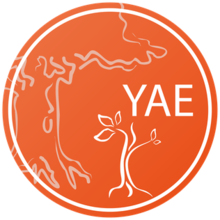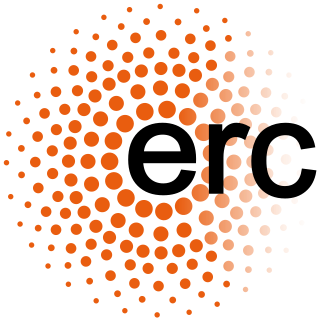
The European Research Council (ERC) is a public body for funding of scientific and technological research conducted within the European Union (EU). Established by the European Commission in 2007, the ERC is composed of an independent Scientific Council, its governing body consisting of distinguished researchers, and an Executive Agency, in charge of the implementation. It forms part of the framework programme of the union dedicated to research and innovation, Horizon 2020, preceded by the Seventh Research Framework Programme (FP7). The ERC budget is over €13 billion from 2014 – 2020 and comes from the Horizon 2020 programme, a part of the European Union's budget. Under Horizon 2020 it is estimated that around 7,000 ERC grantees will be funded and 42,000 team members supported, including 11,000 doctoral students and almost 16,000 post-doctoral researchers.

The New York Academy of Sciences was founded in January 1817 as the Lyceum of Natural History. It is the fourth oldest scientific society in the United States. An independent, nonprofit organization with more than 20,000 members in 100 countries, the academy has a mission to advance scientific research and knowledge, support scientific literacy, and promote science-based solutions to global challenges. The academy hosts programs and publishes scholarly scientific content in the life, physical, and social sciences, including several areas of cross-discipline inquiry such as nutrition, artificial intelligence, space exploration, and sustainability. The academy's programs and publications are designed to discuss and disseminate accurate and timely scientific information to its members, the broad scientific community, the media, and the public. The academy also provides professional and educational resources for researchers across all phases of their careers. The president and CEO of the academy is Nicholas Dirks. The chair of the board of governors is Jerry Hultin, chair and co-founder of Global Futures Group, LLC.

The European Molecular Biology Organization (EMBO) is a professional, non-profit organization of more than 1,800 life scientists. Its goal is to promote research in life science and enable international exchange between scientists. It co-funds courses, workshops and conferences, publishes five scientific journals and supports individual scientists. The organization was founded in 1964 and is a founding member of the Initiative for Science in Europe. As of 2022 the Director of EMBO is Fiona Watt, a stem cell researcher, professor at King's College London and a group leader at the European Molecular Biology Laboratory.

The Mexican Academy of Sciences(Academia Mexicana de Ciencias) is a non-profit organization comprising over 1800 distinguished Mexican scientists, attached to various institutions in the country, as well as a number of eminent foreign colleagues, including various Nobel Prize winners. The organization, which encompasses exact and natural sciences as well as the social sciences and humanities, is founded on the belief that education, based on the truth of scientific knowledge, is the only means, in the short and long term, of achieving the development of the Mexican spirit and national sovereignty.

The Academia Europaea is a pan-European Academy of Humanities, Letters, Law, and Sciences. The Academia was founded in 1988 as a functioning Europe-wide Academy that encompasses all fields of scholarly inquiry. It acts as co-ordinator of European interests in national research agencies.
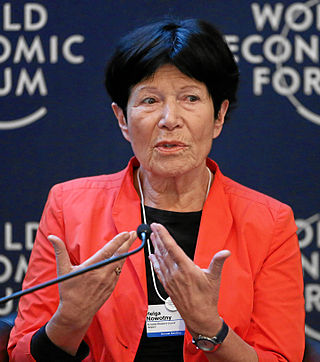
Helga Nowotny is Professor emeritus of Social Studies of Science, ETH Zurich. She has held numerous leadership roles on Academic boards and public policy councils, and she has authored many publications in the social studies of science and technology.

The European University Institute (EUI) is an international postgraduate and post-doctoral teaching and research institute and an independent body of the European Union with juridical personality, established by the member states to contribute to cultural and scientific development in the social sciences, in a European perspective. EUI is designated as an international organisation. It is located in the hills above Florence in Fiesole, Italy. In 2021, EUI's School of Transnational Governance, with its flagship graduate and executive programmes, moved to the Casino Mediceo di San Marco, which is a late-Renaissance or Mannerist style palace in the historic centre of Florence.

Dorret I. Boomsma is a Dutch biological psychologist specializing in genetics and twin studies.
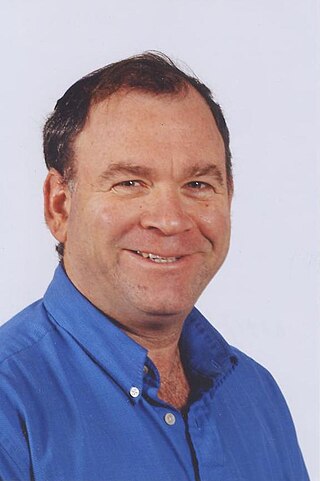
Alexander Lubotzky is an Israeli mathematician and former politician who is currently a professor at the Weizmann Institute of Science and an adjunct professor at Yale University. He served as a member of the Knesset for The Third Way party between 1996 and 1999. In 2018 he won the Israel Prize for his accomplishments in mathematics and computer science.
Giulio Superti-Furga is an Italian molecular and systems biologist based in Vienna, Austria, and a member of the Scientific Council of the ERC. He is the Scientific Director of CeMM, the Research Center for Molecular Medicine of the Austrian Academy of Sciences, and Professor of Medical Systems Biology at the Medical University of Vienna.

Blavatnik Awards for Young Scientists was established in 2007 through a partnership between the Blavatnik Family Foundation, headed by Leonard Blavatnik, chairman of Access Industries, and the New York Academy of Sciences, headed by president Nicholas Dirks.
Eystein Jansen is a Norwegian professor in marine geology and paleoceanography at the University of Bergen, and researcher and former Director of the Bjerknes Centre for Climate Research (BCCR). He is also the vice-president of the European Research Council (ERC), as the scientific leader of the EU's commitment to basic research in the fields of physical sciences and engineering.
The Science Academy Society is an independent, private, self-governing organization founded on November 25, 2011 in Istanbul, Turkey.
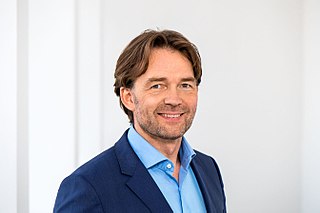
Matthias H. Tschöp is a German physician and scientist. He is the chief executive officer and scientific director of Helmholtz Zentrum München, German Research Center for Environmental Health. He is also Alexander von Humboldt Professor and Chair of Metabolic Diseases at Technical University of Munich and serves as an adjunct professor at Yale University.

Alfio Quarteroni is an Italian mathematician.

Rachid Deriche is a research director at Inria Sophia Antipolis, France, where he leads the research project Athena aiming to explore the Central Nervous System using computational imaging. He has published more than 60 journals and more than 180 conferences papers with a Google Scholar H-index of 67. He is known for the development of the edge detection algorithm, named after him.
Nicola Maria Pugno is an Italian scientist, mechanical engineer, astrophysicist, with phds in fracture mechanics as well as biology. He is a full professor of solid and structural mechanics at the University of Trento and of materials science at the Queen Mary University of London.

Nicole Grobert FRSC FYAE is a German-British materials chemist. She is a professor of nanomaterials at the Department of Materials at the University of Oxford, fellow of Corpus Christi College, Oxford, and a Royal Society industry fellow at Williams Advanced Engineering. Grobert is the chair of the European Commission's Group of Chief Scientific Advisors.

Marileen Dogterom is a Dutch biophysicist and professor at the Kavli Institute of Nanoscience at Delft University of Technology. She published in Science, Cell, and Nature and is notable for her research of the cell cytoskeleton. For this research, she was awarded the 2018 Spinoza Prize.

Eveline Crone is a Dutch professor of cognitive neuroscience and developmental psychology at Leiden University. Her research focuses on risky behaviors in adolescent humans during puberty and examines the function of those risks. For her research in adolescent brain development and behaviour, she was awarded the Spinoza Prize, the highest recognition for Dutch scientists, in 2017.
